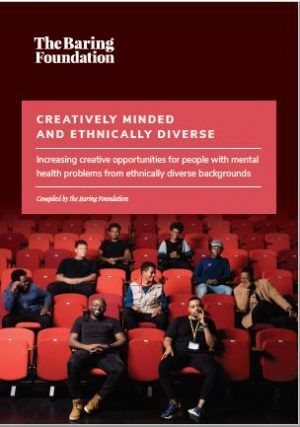Lisa Rodio is Director of Community & Education (Maternity Cover) at the RPO and Sigrun Saevarsdottir-Griffiths is a Creative Workshop Leader at the RPO.
In Autumn 2021, the Royal Philharmonic Orchestra’s (RPO) community and education team began an 18-month pilot programme of creative music activity supporting Brent residents experiencing mental health challenges as part of the Baring Foundation’s Creatively Minded and Ethnically Diverse funding stream. Developed with Brent Council and their adult and children’s social services, three project strands were designed to demonstrate how creative music-making alongside our professional musicians could support recovery for adults and adolescents in secure and community settings, bringing people together to create and perform high-quality music.
Running alongside all three project strands, three local musicians were recruited to take part in a paid training programme to develop skills in leading creative music in these settings. Recruits came from local partners including Brent Black Music Co-Op and mental health drop-in centre The Cove, and a wide range of musical backgrounds from reggae to gospel. One of the trainees had previous experience of working with young people, but none had ever used music in mental health units.
An initial training session in February 2022 introduced the three trainees to the RPO team and our ways of working and demonstrated various techniques and activities we use in these settings to get participants creating and performing music quickly. From call and response instrumental work, to singing and groove-based music-making, trainees were given the chance to experience and try their hand at leading the basic building blocks of sessions. Trainees were then invited to select up to seven sessions on our various project strands running through July 2022, which they would support as trainee leaders. In this way, musicians were able to select whether they preferred to focus on a particular context (for example, adolescents at risk of exclusion due to mental health challenges) or to see a broad range of settings that might interest them (including secure settings and those for dual diagnoses of mental health and learning disabilities).
When attending sessions, trainees first received a short briefing with the RPO Workshop Leader to understand the planned structure and content, and their role within the session. Support and guidance were then provided by the RPO team, including pairing up RPO musicians and trainee leaders. Initially, the team planned for trainees’ roles to progress through their seven sessions, handing over more leadership responsibilities as their experience and confidence grew. However, given the sensitivities of participants in these settings, this proved more difficult than in other training programmes.
RPO Workshop Leader Sigrun Saevarsdottir-Griffiths took a lead role in the programme, delivering the initial training session in February and supporting two of the three project strands. Sigrun reflected on the successes and challenges of the programme:
“I was delighted to work with the three trainees and to be involved in broadening their vision for how their musicality can be beneficial to people experiencing mental health challenges. They are all brilliant musicians with such positive and generous attitudes. Their enthusiasm for gaining leadership experience within the mental health context was unquestionable; however, it was hard to find the most appropriate practical ways to get them involved in supporting the facilitation of the projects. In some instances, time restraints were the main barrier, whereas in other settings the sensitivity and challenge of the context made this difficult. It would be wonderful to have more training sessions with the team, where we could take our time to explore and discuss the practical music approaches and the challenges related to working within this context.”
Despite the challenges that made progressively handing over leadership tasks more difficult than planned, all three trainees completed their seven sessions in July 2022, and are now working with us to devise their next steps. A training and ‘round-up’ session with Sigrun at the end of October will allow the team to bring questions, seek advice and try out techniques with RPO musicians as participants. Additional sessions with adults in Brent will allow trainees to continue to shadow Sigrun and other experienced leaders in mental health sessions with specific aims for their own development. In some cases, this includes stepping further out of trainees’ comfort zones by, for example, supporting work in secure units in addition to community spaces. Additionally, the RPO has committed to engaging trainees in non-mental health settings on other projects, where they can more easily try out their own leadership skills before returning with us to mental health units.
The pilot programme has allowed the RPO and local partners to test out a range of ways we can use creative music to support local residents, and in particular in refining how we work with trainee leaders in these sensitive settings. The RPO and partners look forward to continuing to develop this strand of work in the borough, and in continuing to engage and support local musicians from diverse backgrounds across our activity.
The RPO was awarded one of 25 grants in our Creatively Minded and Ethnically Diverse funding round which aims to increase representation of ethnically diverse artists in arts and mental health work.
